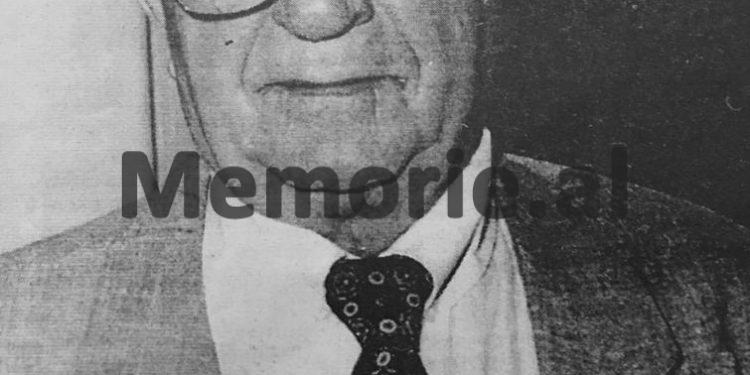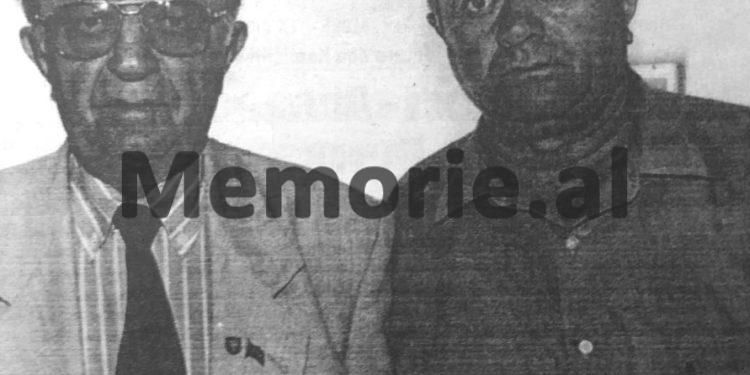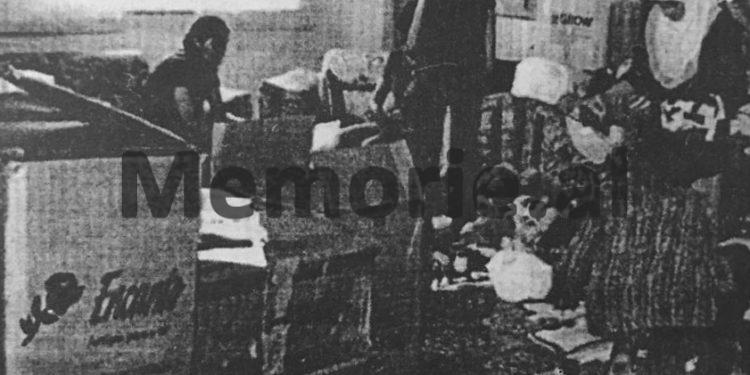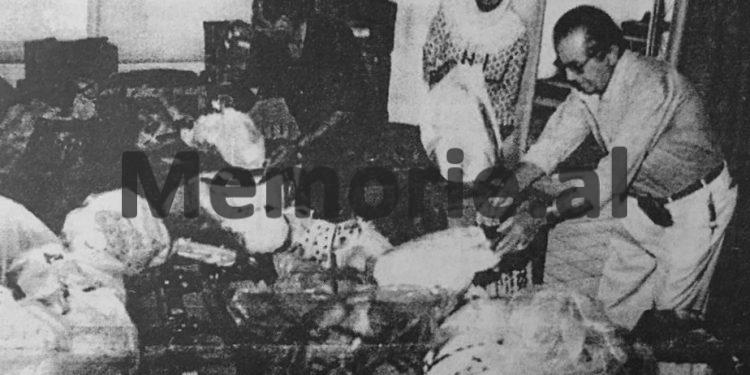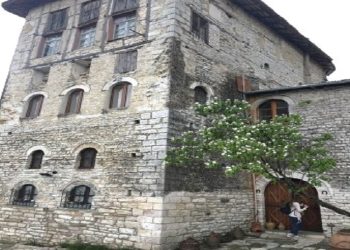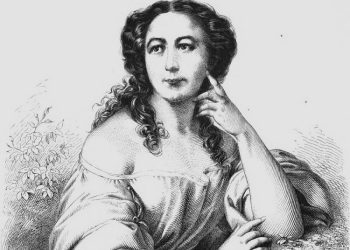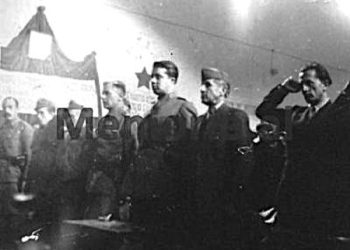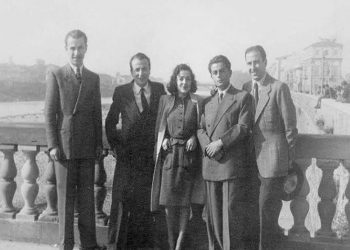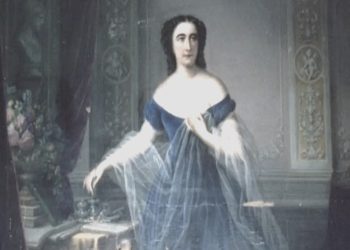Dashnor Kaloçi
Memorie.al publishes the unknown story of Hiqmet Pollo, originally from Lazarat, Gjirokastra, one of the well-known families of that province, where during the Anti-Fascist War, its first, Hysni Pollo, was one of the main exponents of the nationalist organization, Balli Kombëtar, which caused the members of that family to end up in prisons and internments immediately after 1944, when the communists came to power, where Hysniu himself was sentenced to 101 years in prison by the Gjirokastra District Court, and his son his, Xhemali, was forever crippled by the tortures inflicted on him by State Security officers. Hiqmet Pollos fled Albania in 1950, where he and his friend Hysen Mati, from Gjirokastra, crossed the state border in the area of the village of Radat, and after staying for several years in the Llavrios political emigrant camp, gained political asylum and immigrated to distant Brazil. The return of Hiqmet Pollo to Albania in 1994, when the Albanian government headed by Prime Minister Aleksandër Meksi appointed him Honorary Consul of Albania in Brazil and his return to Albania in 1998, after collecting 104 tons of humanitarian aid for Kosovar refugees. Who were forcibly expelled from their ethnic lands by the Milosevic regime?
It was the first days of June 1998, when in one of the offices of the government commission for the administration of humanitarian aid for Kosovars who came to Albania, a fax arrived from Brazil, announcing a large amount of aid that had started from this distant country of the American-southern continent, gathered and under the care of an Albanian with permanent residence in Brazil! Who was this Albanian, how could he immigrate to that distant country and under what circumstances was he there?!
The Pollo family under savage communist persecution!
His name is Hiqmet Pollo and he was born in the village of Lazarat in Gjirokastra, in 1932. Hiqmet’s father, Hysni Pollo, during the war, had been a member of the nationalist factions of the organization “Ballit Kombëtar” and as one of its main exponents, was elected commissioner of “Balli” for the Region of Gjiroksatra. A few days after the end of the war in 1944, Hysni Pollo was arrested by the new communists in power and sentenced by the Gjirokastra Court to 101 years in prison, as before, during the war after the murder of Hysni Lepenica, his relatives, the partisans had sentenced him in absentia, to death. After Hysni was arrested, his family was interned in the villages of Lushnja and all their property was confiscated, which was quite considerable. One of Hysni’s sons, Xhemali, was arrested by the State Security after the family was deported, and he was crippled forever after being tortured. After the Pollo family was branded “enemies of the people”, their livelihoods were extremely difficult, even to the point of impossible to keep their souls alive! Given the situation she was in, the other son of the family was looking for work to support his siblings, but no one helped him. “Go eat the gold that Hysni left you”, was the answer for the children of the Pollo family.
Hysni’s escape from Albania in 1950
In these very difficult conditions and unable to make a living, Hiqmeti together with a friend of his, called Gjirokastra, Hysen Mati, decided to leave Albania for good, making plans to flee to Greece. Thus, in the beginning of 1950, according to the plan made, they leave for the province of Dropull and from the mountain of Buretos, exit to Radat and cross the state border, arriving safely in the Greek land. After many vicissitudes wandering through the mountains, for fear of being captured by the Greek communists of the “EAM”, they finally, with the help of a Greek shepherd, were able to go and surrender to the Llavros refugee camp. , in which at that time there were many other anti-communist Albanians, as well as from various Eastern European countries. In that camp, Hiqmet, together with his friend Hyseni, stayed for a year, until one day an order came from the UN High Commissioner for Refugees, announcing that he would distribute them throughout the country. Various of the West, who had accepted the reception of these refugees. After the dispersal of a large number of refugees to the United States of America, about 75 Albanians remained in that camp, which had not met the physical parameters to go to the United States.
From Lavros, Greece, to faraway Brazil!
On the same day, the 75 Albanians who could not immigrate to the United States were informed that their refuge would now be Brazil. On a large steamer, on December 4, 1951, the 75 Albanians of the Llavros camp would embark on a long voyage to Brazil. But for the newly arrived Albanians in Brazil, it was not said that their suffering was already over. “We worked where we could, slept under bridges and on the subway, there were days when we had nowhere to work, we were left without food…”, remembers Hiqmeti, the first days when he arrived in Brazil. After a year in various jobs, Hiqmeti was able to open a private business with great difficulty, with several transport trucks and taxis. This business opened by him, was among the only ones that could be opened by Albanians, with whom he had arrived there from Greece.
Notary education and establishment of the Real Estate Agency
With the business set up, Hiqmet was able to significantly adjust his livelihood and in 1976, he started a three-year school, for notary, attending it without taking a single day off from working in his business. After graduating from this school, Hiqmeti obtained his notary license and further expanded his business, opening a Real Estate Agency. As activity increased, Hiqmet was able to purchase a large area of construction land, which he administered himself. After all this he was able to secure his livelihood, in 1972, Hiqmet decided to start a family and married a girl of Italian descent, named, Irene Bonese. From that marriage, two daughters were born to them, about whom Hyseni says that, if you ask them, they answer with great pride that they are Albanian and have inherited almost everything from their father, from the language, traditions, customs of the province of Gjirokastra, etc. What about the other Albanians who arrived in Brazil at the same time as Hiqmet, where are they and are they at all involved in the life of that huge country? Regarding this, Hiqmeti says: “Already after so many years since our arrival in Brazil, out of 75 Albanians, there are only about 10 people left.”Others have died one by one at different times and their families are losing their origins,” Hiqmeti said with regret.
July 3, 1990, Hiqmet’s brother from Albania to Brazil!
While Hiqmet Pollo had lived for nearly 20 years in Matogroso, Brazil, he had no knowledge of his family in Albania, whom he had left behind in the mud of the Myzeqe fields and internment camps since he left for in 1950. Although Hiqmet wrote regularly, for 20 years he could not get any answer as to what was going on with his family. Since the family had not received any news of Hiqmet, they thought he was dead and made no further attempt to inquire about his fate. But in 1971, when the communist regime in Albania allowed a kind of liberalism that was felt somewhat in the “class war”, the Pollo family was allowed to receive letters sent by their son from Brazil. 20 years later, on July 2, 1990, with the opening of embassies in Tirana, one of Hiqmet’s brothers, Fitimi, unable to endure the difficult life in which he was, entered the Italian embassy and was able to leave with other refugees to Italy, where he stayed for 22 days, in one of the interior premises of the Brazilian embassy in the Vatican. During all this time, Fitim was able to contact his brother, Hiqmet, who did not find it difficult to provide him with the necessary documents. Thus, after a few days, Fitim Pollo arrived at Matogroso airport, where his brother, who had not seen him for 40 years, was waiting for him. The two brothers, Hiqmet and Fitim, weep when they remember that meeting and especially when Hiqmet learned from his brother that both their parents were no longer living…., After they had passed away, from the hardships of life in the barracks of internment in the fields of Myzeqe. Profit stayed for about eight months as a tourist with his brother, Hiqmet, enjoying all the beauties of Brazil and then returned to Albania, where he had left his family and where the communist regime was already in its last throes.
1994, Hiqmeti, Honorary Consul of Albania in Brazil
After 44 years of emigration, in 1994, Hiqmet Pollo, together with his family, his Italian wife and their two daughters, was able to come to his homeland for the first time, from where he had left years ago due to political circumstances. Of the family and the miserable economic situation where she was. After many meetings and longings with relatives, friends and his country, such as Gjirokastra, etc., he was received in a meeting by the official Albanian authorities of the Ministry of Foreign Affairs in Tirana, who informed him that the government led by the Prime Minister, Aleksandër Meksi, had appointed him, Honorary Consul in Brazil. The Albanian government did that after receiving through official channels the necessary information for the very correct work of Hiqmet Pollos and the very positive assessments of the federal government of the Brazilian state. Thus at that time, Hiqmeti was the only official representative of the Albanian government in distant Brazil, where lived a very limited number of Albanians, who like other immigrants from different countries of the world, had their worries, problems and their concerns related to the origin.
Two months in Brazil, to collect aid for Kosovo!
With the NATO pact allied bombing of Yugoslavia in March 1998, Hiqmeti says he was one of the first Albanians living in Brazil to be well-informed about what was happening in the other half of his homeland. . Regarding this period of time, he recalls “As soon as I saw on various television networks the first planes that violated in Albania with humanitarian aid for our Kosovar brothers, it immediately occurred to me that we Albanians in Brazil, to do something, as much as we could, to their aid ”. Thus, after “grinding in his head” his plan to start an awareness campaign in some Brazilian states, Hiqmeti informed his brother in Gjirokastra, Fitim, to leave immediately for Brazil, (according to the guarantee he had sent on first), in order for him to assist him in the campaign for collecting aid and sending it to Albania. Two or three days after this announcement, Fitim arrived again at Matogroso airport, where his brother, Hiqmet, had already started work. In this regard, he says: “The first job I did was to officially notify the Matogroso State Parliament, which immediately offered us generous assistance. After that, I communicated and immediately connected with two Islamic charities that operated and had their activity in Matogrosa and San Paulo. “Both of these associations worked with great dedication for two months in a row, collecting clothing and food aid for Kosovo.” Thus, after an awareness-raising work done by Hiqmet in the direction of the fundraising campaign, he shows that he had an extremely large support even from the official Brazilian authorities, which he had not even thought of. He also shows that a great help in this direction was given by the local print and electronic media, which every five minutes, in all 24-hour broadcasts, gave the initials “SOS KOSOVO” with subtitles.
In 45 days, in Matogrosa and San Paulo, 104 tons of aids are collected for Kosovo
After that, the official authorities obtained a special permit for the placement of posters, posters and awareness banners, which were placed in the centers of the states of Matogroso and San Paulo, where their residents went and donated various packages to help Kosovar refugees. . Regarding this, Hiqtemi recalls: “After working for no more than a month and a half, we were able to collect a quantity of aid of 104 tons. When we left in two large trucks from Matogroso (a country of 1 million people) to San Paulo, where we would receive other aid, we placed a large banner at the top of the first truck that read: ” THANK YOU TO THE PEOPLE OF MATOGROSOS” Our barges with assistance accompanied the Traffic Police on several motorcycles, until they arrived at their destination, in San Paulo, where they were loaded on a large steamer that would travel to the Hellenic port of Thessaloniki. For this entire trip, the expenses were covered by the Kuwaiti Charity Association based in Albania. “After that, on June 2, 1998, the aid ship left San Paulo and arrived in the Greek port of Thessaloniki on July 2,” Hiqmeti recalled of the humanitarian aid he could send from faraway Brazil to the Kosovar brothers. After announcing the arrival at the port of Thessaloniki by steamer, Hiqmeti together with his brother, Fitim, made it possible for them to settle in four large trucks, which they themselves accompanied in the direction of Albania, until they were brought to Tirana. , to the Kuwaiti Charitable Association, which distributed them in Kosovo, after the return of Kosovar refugees to their homes.
Evaluation Removes Pollos from the universities of Matogroso, San Paulo and Rio de Janeiro
All that colossal work that Hiqmet Pollo did to help the Kosovar brothers, which was widely covered by the local media, also attracted the attention of several universities and colleges in Matogroso, San Paulo and even Rio de Janeiro, which invited him. to speak and give various lectures on the history of Kosovo and Albania, which were little known there, if at all. “Brazilian students and different people could not understand the great drama of Kosovars and asked how it was possible that: Kosovar emigrants who were Albanians, were forcibly mixed from their ethnic lands…”, recalled Hqmet Pollo, regarding the total lack of information and knowledge they had about Albania and Kosovo in distant Brazil.
To build “bridges” between Brazil and Albania
In his last days in Albania, in the first days of July 1989, when Hiqmet had a few hours left in Albania, after he would return to Brazil, he told us that: what he had done, there was no great thing, before the plans and projects he had in the future in terms of “building bridges” between Albania and Brazil. Thus, in this context, Hiqmeti indicated that he had made contact with the Albanian embassy in Argentina (which also covered Brazil), meeting the ambassador of that time, Mr. Edmond Trako, from whom he had found a full readiness for his plans in it. The future. Also, sometime in 1997, Hiqmeti had formed the Brazil-Albania Cultural Society in Brazil, where in its inauguration ceremony, attended by 33 ambassadors and diplomats from different countries of the world accredited in faraway Brazil. “My goal is for this cultural association to serve as a starting point for the recognition of the cultural values of the two countries, until different exchanges of artists and cultural groups between them,” said Hiqmeti for the newly established association. In addition, Hiqmeti indicated that he had started work to contact various businessmen and businessmen of the state of Matogroso, in order to bring them to a future in Albania, where they look at the possibility of investing their capital. . “Do not find this impossible”, said Hiqmet Pollo, Gjirokastra native from the village Lazart, who, although 70 years ago, was considered an “enemy of the people”, said that for his homeland, he will not the worker worked long enough to keep his breath alive./ Memorie.al




